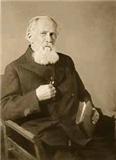Obruchev, Vladimir
Vladimir Obruchev (1863-1956) was a prominent Soviet geologist and had a  mineral, obruchevite, named in his honour. He was also one of Russia’s first science fiction writers, publishing Plutonia in 1915,>later published in 1924 and his Sannikov Land, also published in 1924. Susanne Frank has written a paper(a) on the science and mythology behind these stories.
mineral, obruchevite, named in his honour. He was also one of Russia’s first science fiction writers, publishing Plutonia in 1915,>later published in 1924 and his Sannikov Land, also published in 1924. Susanne Frank has written a paper(a) on the science and mythology behind these stories.
“This article analyses the popular novel Sannikov’s land (published in 1926) by the famous Russian and Soviet geologist Vladimir A. Obruchev (1863–1956). It asks how scientific discourse on the one hand, and literary, fictional discourse on the other interact in this text that tells the story of the discovery of an Arctic island, which a Russian merchant had asserted to have seen, but the existence of which never could be affirmed. Basing his novel exclusively on well-founded scientific (geological as well as anthropological) hypotheses, Obruchev polemizes with a whole range of earlier texts from J. Verne to K. Hloucha. Unfolding the story of the Russian expedition, Obruchev pursues the aim (1) to deconstruct the utopian myth of a paradise on earth beyond the Arctic ice in its countless varieties; (2) to show that ancient myths—like the myth of the ex- istence of warm islands in the Arctic—are a form of protoscientific insight that should be taken seriously by modern science and transformed into scientific knowledge; and (3) to suggest that the Arctic islands—really existing, supposed to exist or be doomed—from a geological point of view belong to the Siberian mainland and therefore to Russian/Soviet territory.”<
He was also a leading authority on the civilisations of the Gobi Desert.
He accepted that Plato’s story of Atlantis was ‘plausible’ and believed that from a geological perspective that the submergence of a large landmass in the Atlantic around 11,000 years ago was possible but probably not at the rapid rate recorded by Plato.
Zhirov informs us [0458.318] that after Obruchev’s death an unfinished paper relating to Atlantis was found which proposed that the submergence of Atlantis was brought about by the rising sea levels caused by the melting of the glaciers at the end of the last Ice Age.
